Locally Benchmarking Akka HTTP with akka-persistence-cassandra
Overview
Although what I tried here does not give realistic or useful results, this is another step forward in my experiment to set up benchmarking environment for Akka and Akka HTTP. I am going to add persistence to Cassandra to the system, to see how the benchmark figures are affected.
The source code is available here
Results
In the previous article, Benchmarking Spray and Akka HTTP Hello World servers, the web server just returned the constant response. Here I am comparing three different types of web servers.
- Akka HTTP server with JSON marshalling/unmarshalling
- Akka HTTP server with JSON marshalling/unmarshalling, and in-memory persistence
- Akka HTTP server with JSON marshalling/unmarshalling, and akka-persistence-cassandra
Like explained in the previous article, the 1st attempt in benchmarking could be affected by incomplete JIT compliation. So I only show results from the 2nd and 3rd attempts here.
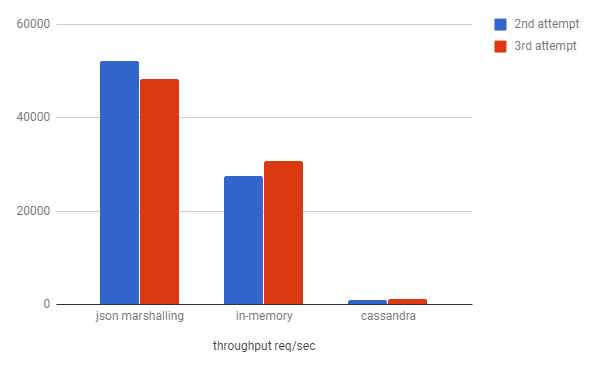
| Attempt | 1. JSON | 2. In-Memory | 3. Cassandra | |:-----------|----------------:|:--------------:|:--------------:| |2nd attempt | 52,196 req/sec | 27,507 req/sec | 992 req/sec | |3rd attempt | 48,293 req/sec | 30,746 req/sec | 1,122 req/sec |
Comparing the throughput, obviously adding Cassandra and wait the HTTP response until Cassandra persistence is done makes the performance order of magnitude going down, and the CPU usage for 3 were around 40% although that of 1 and 2 topped at 100% like the prevoius article. (i.e.) The bottleneck is shifted to database I/O from CPU resource competition between the web client and server.
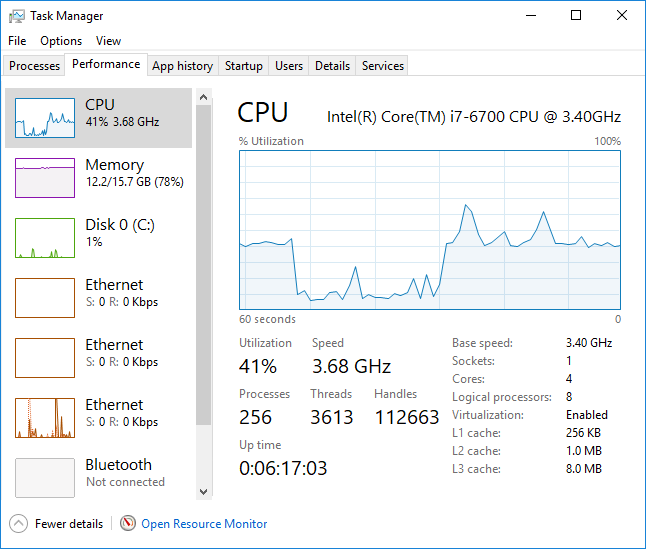
The below is the comparison of average latency,
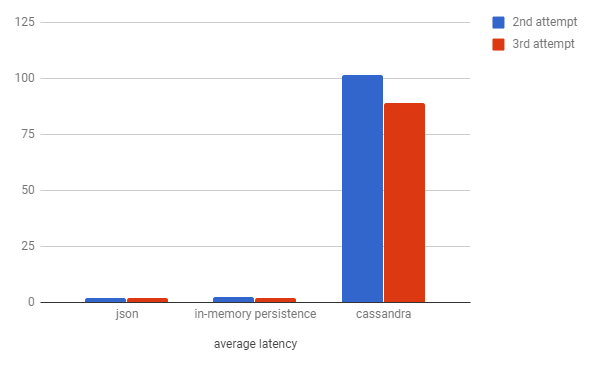
| Attempt | 1. JSON | 2. In-Memory | 3. Cassandra | |:-----------|----------------:|:--------------:|:---------------:| |2nd attempt | 2.17 millisec | 2.41 millisec | 101.55 millisec | |3rd attempt | 2.16 millisec | 2.10 millisec | 88.92 millisec |
and the max latency.
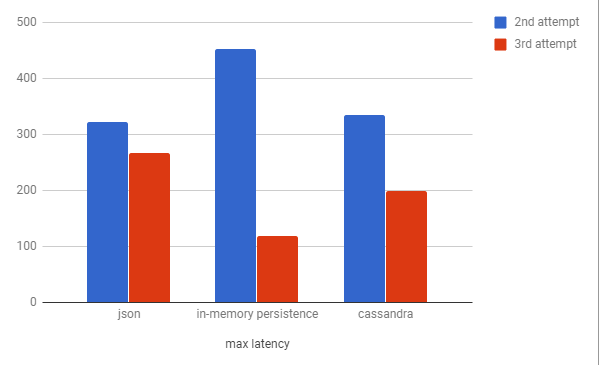
| Attempt | 1. JSON | 2. In-Memory | 3. Cassandra | |:-----------|----------------:|:--------------:|:---------------:| |2nd attempt | 321.87 millisec| 452.84 millisec| 335.73 millisec | |3rd attempt | 267.60 millisec| 119.31 millisec| 199.44 millisec |
From here, let's see how I set up the servers for 1, 2 and 3.
1. JSON marshalling/unmarshalling
I am not going in detail, but JSON marshalling is converting a Scala case class instance to JSON payload, and unmarshalling is the opposite.
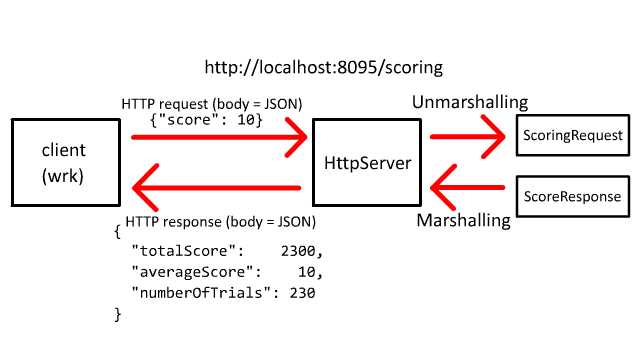
This HttpServer does simple stuff, to sum up all the "score" sent in HTTP responses, and return the current total, average and number of trials (number of HTTP requests) so far.
Let's define case classes to marshall to/unmarshall from JSON:
//JSON request {"score": 10} can be unmarshalled to this
case class ScoringRequest(
score: Double
)
//This case class can be marshalled to JSON response {"averageScore": ... }
case class ScoreResponse(
averageScore: Double,
totalScore: Double,
numberOfTrials: Long
)To enable marshlling and unmarshalling, I used SprayJsonSupport as follows:
import akka.http.scaladsl.marshallers.sprayjson.SprayJsonSupport
import spray.json.DefaultJsonProtocol
object ScoringJsonSupport extends DefaultJsonProtocol with SprayJsonSupport {
implicit val scoringRequestFormat = jsonFormat1(ScoringRequest)
implicit val scoreResponseFormat = jsonFormat3(ScoreResponse)
}And the route becomes like this.
import ScoringJsonSupport._
...
val routes: Route =
path("scoring") {
post {
entity(as[ScoringRequest]) { request =>
updateState(request.score)
complete {
ScoreResponse(averageScore, totalScore, numberOfTrials)
}
}
}
}For those who are intersted, the full HttpServer code is as follows:
import java.io.{PrintWriter, StringWriter}
import akka.actor.ActorSystem
import akka.http.scaladsl.Http
import akka.http.scaladsl.server.{Directives, Route}
import akka.stream.ActorMaterializer
import akka.util.Timeout
import scala.concurrent.Await
import scala.concurrent.duration._
object HttpNoPersistentServer extends Directives {
def main(args: Array[String]): Unit = {
import ScoringJsonSupport._
implicit val system: ActorSystem = ActorSystem("HttpNoPersistentServer")
implicit val materializer: ActorMaterializer = ActorMaterializer()
implicit val timeout: Timeout = 3.seconds
var averageScore: Double = 0
var totalScore: Double = 0
var numberOfTrials: Long = 0
def updateState(score: Double): Unit ={
totalScore = totalScore + score
numberOfTrials = numberOfTrials + 1
averageScore = totalScore / numberOfTrials
}
try {
val routes: Route =
path("scoring") {
post {
entity(as[ScoringRequest]) { request =>
updateState(request.score)
complete {
ScoreResponse(averageScore, totalScore, numberOfTrials)
}
}
}
}
Http().bindAndHandle(routes, "localhost", 8095)
println(s"Server online at http://localhost:8095/")
Await.result(system.whenTerminated, Duration.Inf)
} catch {
case t: Throwable =>
val sw = new StringWriter
t.printStackTrace(new PrintWriter(sw))
println(t.getMessage)
println(sw)
}
}
}To send a JSON request by wrk, you need to write a lua script like this:
wrk.method = "POST"
wrk.body = '{"score": 10}'
wrk.headers["Content-Type"] = "application/json"I saved it as wrk-script.lua, and ran the following command:
$ wrk -t2 -c100 -d30s -s wrk-script.lua http://localhost:8095/scoringThe results were already pasted at the beginning of this article.
2. In-Memory persistence
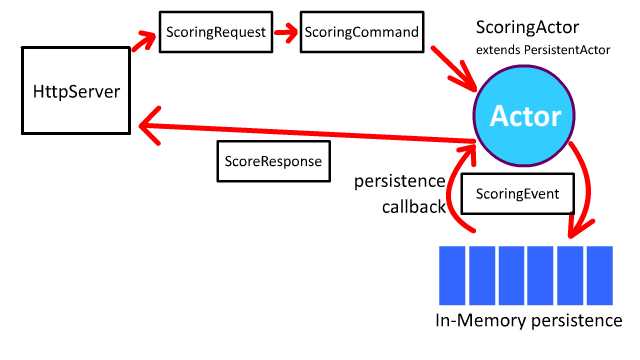
Now I'm adding persistence to the system, but before doing it with Cassandra, I'm using in-memory persistence. The persistent actor code is as follows:
class ScoringActor extends PersistentActor {
import ScoringActor._
var averageScore: Double = 0
var totalScore: Double = 0
var numberOfTrials: Long = 0
def persistenceId = "scoring"
def updateState(score: Double): Unit ={
totalScore = totalScore + score
numberOfTrials = numberOfTrials + 1
averageScore = totalScore / numberOfTrials
}
def receiveCommand = {
case ScoringCommand(score) =>
val _sender = sender()
persist(ScoringEvent(score)) {
evt => updateState(evt.score)
_sender ! ScoreResponse(
averageScore,
totalScore,
numberOfTrials
)
}
}
override def receiveRecover = {
case evt: ScoringEvent =>
updateState(evt.score)
}
}
object ScoringActor {
case class ScoringCommand(score: Double)
case class ScoringEvent(score: Double)
}The HttpServer code needs to instantiate the persistent actor (ScoringActor) and do scoringActor ? ScoringCommand(request.score) to perform persistence.
import ScoringJsonSupport._
implicit val system: ActorSystem = ActorSystem("HttpPersistentServer")
implicit val materializer: ActorMaterializer = ActorMaterializer()
val scoringActor = system.actorOf(Props[ScoringActor], "scoring")
implicit val timeout: Timeout = 3.seconds
val routes: Route =
path("scoring") {
post {
entity(as[ScoringRequest]) { request =>
complete {
(scoringActor ? ScoringCommand(request.score)).mapTo[ScoreResponse]
}
}
}
} here is application.conf:
akka {
loggers = ["akka.event.slf4j.Slf4jLogger"]
persistence {
journal {
plugin = "akka.persistence.journal.inmem"
}
snapshot-store {
plugin = "akka.persistence.snapshot-store.local"
}
}
}As in the results we saw earlier, it became slower than 1. JSON marshalling/unmarshalling, because there is communication between the server and the persistent actor. However, the persistent actor itself is still lightweight, compared to the actual persistence to Cassandra which I'll explain next.
3. Persistence to Cassandra
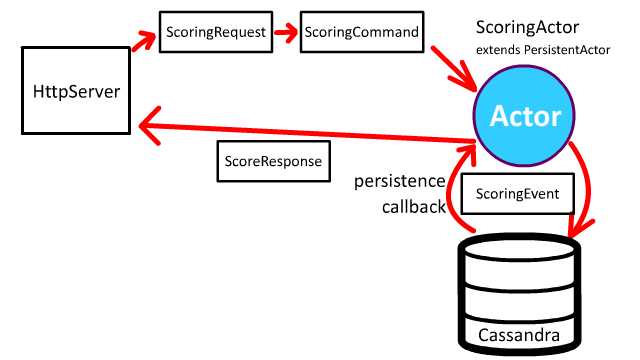
Finally we do real persistence. application.conf becomes this:
akka {
loggers = ["akka.event.slf4j.Slf4jLogger"]
persistence {
journal {
plugin = "cassandra-journal"
}
snapshot-store {
plugin = "cassandra-snapshot-store"
}
}
}And you would also need this logback.xml otherwise the log is filled up by a lot of DEBUG level messages from the Cassandra library.
<configuration>
<appender name="STDOUT" class="ch.qos.logback.core.ConsoleAppender">
<!-- encoders are assigned the type
ch.qos.logback.classic.encoder.PatternLayoutEncoder by default -->
<encoder>
<pattern>%d{HH:mm:ss.SSS} [%thread] %-5level %logger{36} - %msg%n</pattern>
</encoder>
</appender>
<logger name="com.datastax.driver.core.Connection" level="WARN" additivity="false" />
<logger name="com.datastax.driver" level="WARN" additivity="false" />
<root level="INFO">
<appender-ref ref="STDOUT" />
</root>
</configuration>No need to change the Scala code.
Lessons learned
Even before conducting the benchmark, we could have guessed that Cassandra would be the bottleneck of the system, as database I/O is typically the performance bottleneck of a web applicaiton system.
However, to know how much the difference is, experiment is necessary. So I went through the process on how to distinguish the performance overhead of a single component from all the other , and you can apply the same technique to analyze any component in your system.
Next step, I want to dockerize this performance experiment environment so that we can run it in the cloud. Also later on I want to Kubernet-ize this and hopefully the deployment and running of the performance test is just a breeze!!
It's getting interesting to me :)
References
- Marshalling and Unmarshalling in Akka HTTP at - https://doc.akka.io/docs/akka-http/2.5/common/marshalling.html#marshalling
- Persistent actor at - https://doc.akka.io/docs/akka/2.5/persistence.html
- akka-cassandra at https://github.com/akka/akka-persistence-cassandra